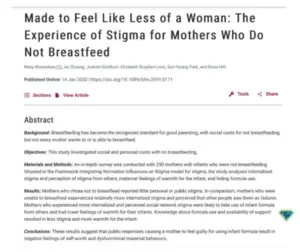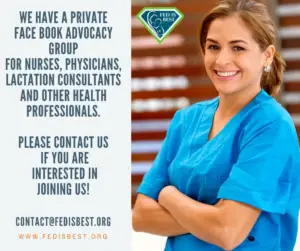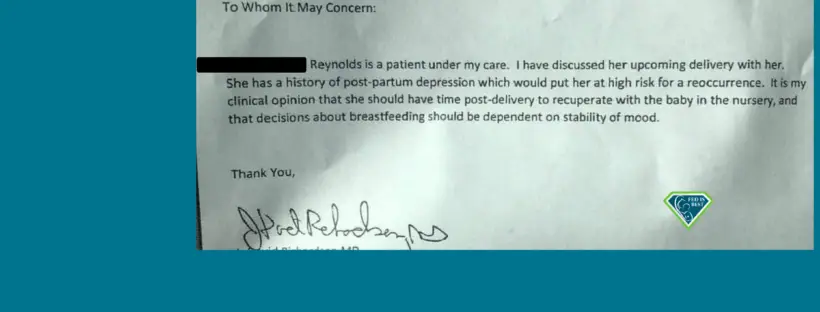The Letter was from my psychiatrist. It was our way of beating a system that neither of us agreed with, or believed was good for my mental health. It provided protection for me to make decisions that went against the Baby-Friendly Hospital mandates.
The amount of stuff a pregnant woman brings to the hospital for delivery gets progressively smaller, the more children she has. With my first child, I brought three bags; I ended up ignoring 90% of the contents and gave my husband fits when he loaded the car for the ride home. By the time I packed the hospital bag for my third child, everything fit neatly into a small duffel. Even then, I felt like I was overpacking. As long as I had a phone charger, some lip balm, and the Letter, I knew I’d be fine.
The Letter was new; I didn’t have it for my other two birth experiences. It was the result of a long, painful journey, and it embodied all of the knowledge I’d gained over the past several years. It represented a feeling of hope I carried with me as I walked onto the labor and delivery floor at my hospital. Things would be different this time.
As I settled in and prepared to give birth, I unzipped my bag and handed the sealed envelope to the L & D nurse. As she opened and read it, I saw her shoulders relax. She took a deep breath, smiled, and said, “This is great. Thank you for letting us know!”
The Letter was from my psychiatrist. It was our way of beating a system that neither of us agreed with, or believed was good for my mental health. It provided protection for me to make decisions that went against the Baby-Friendly Hospital mandates.
I expressed my concerns about delivering at a BFHI during my second session with my psychiatrist, who was managing my depression medication during pregnancy. I had deep scars from the PPD/A that plagued me during the early months of my first two children’s lives. As I walked through those experiences with him, we pinpointed the biological and environmental triggers that exacerbated my condition: breastfeeding and lack of sleep.
My oldest was born before the BFHI was widespread, and my middle child was born at 29 weeks, so this hospital experience would be new for me. As we discussed the mandates at our Baby-Friendly hospital in town, I expressed concern over the rooming-in policy and the push to breastfeed. My post-partum depression hit immediately following the birth of my eldest, and I was still nursing the emotional wounds of the traumatic arrival of my middle daughter.
I knew what my body (and mind) needed after delivery: rest to combat the potential depression and unquestioning support from the nursing staff over my feeding choices.
Hearing my concerns, my psychiatrist suggested writing a letter for me to take to the hospital. Stating that given my medical history of post-partum depression and anxiety, he wrote that I needed time to rest while my newborn stayed in the nursery and that my feeding choices would be based on my mental state at the time.
That was it. A simple, four sentence letter. It was printed, signed, and given to me at my last appointment with him prior to giving birth.
My delivery experience was completely different from my third child. Thanks to the letter, I felt like I was on the same page with everyone in the room. It gave me the confidence to verbalize what I needed. I didn’t have to worry about trying to convince a lactation consultant that I had made the educated decision to not breastfeed. When I asked the nurse to take my daughter to the nursery so I could take a nap, she happily did so, because they had a paper trail (with a medical reason!) allowing them to take her there.
I learned later that after they took my daughter to the nursery, a nurse came back and taped a “Do Not Disturb- Patient Sleeping!” sign on my door. They didn’t allow anyone near my room—even my psychiatrist who had come to the hospital to check on me! This showed me that the nurses truly wanted what was in my best interest. I got so caught up in fighting hospital mandates that I forgot that I would be working with real people, who might disagree with the policies as much as I did.
The Letter not only helped me, but it also protected the nurses, too.
My youngest daughter will be a year old, soon. I still have a copy of the Letter; I pull it out to reference when I talk to new moms about how to navigate hospital policies that may not be conducive to their mental health. I encourage them to talk to their OBGYN, primary care provider, or psychiatrist about having one written for their specific needs. I tell them it was my must-have item in my hospital bag… and it fits in any size bag they decide to take.
-S. Reynolds

Postpartum depression is the most common complication after birth. Suicide is one of the leading causes of death in the first year postpartum. We NEED to start taking maternal mental health more seriously. The idea that breastfeeding prevents PPD is a myth. It can happen to any mom, no matter how she feeds her baby, and each mom can experience it very differently.

This research suggests that public responses causing a mother to feel guilty for using infant formula result in negative feelings of self-worth and dysfunctional maternal behaviors. This paves the way for self-blame and potentially robs women of their authority to be the decision-makers for their infants’ nutritional needs
Maternal Mental Health Feels Like it Comes Second to Breastfeeding When It Should Be First
I Want To Tell Mothers That Bottle Feeding Is Also Beautiful
HOW YOU CAN SUPPORT FED IS BEST
There are many ways you can support the mission of the Fed is Best Foundation. Please consider contributing in the following ways:
- Join us in any of the Fed is Best volunteer and advocacy, groups. Click here to join our health care professionals group. We have: FIBF Advocacy Group, Research Group, Volunteer Group, Editing Group, Social Media Group, Legal Group, Marketing Group, Perinatal Mental Health Advocacy Group, Private Infant Feeding Support Group, Global Advocacy Group, and Fundraising Group. Please send an email to Jody@fedisbest.org if you are interested in joining any of our volunteer groups.
- If you need infant feeding support, we have a private support group– Join us here.
- If you or your baby were harmed from complications of insufficient breastfeeding please send a message to contact@fedisbest.org
- Make a donation to the Fed is Best Foundation. We are using funds from donations to cover the cost of our website, our social media ads, our printing and mailing costs to reach health providers and hospitals. We do not accept donations from breast- or formula-feeding companies and 100% of your donations go toward these operational costs. All the work of the Foundation is achieved via the pro bono and volunteer work of its supporters.
- Sign our petition! Help us reach our policymakers, and drive change at a global level. Help us stand up for the lives of millions of infants who deserve a fighting chance. Sign the Fed is Best Petition at Change.org today, and share it with others.
- Share the stories and the message of the Fed is Best Foundation through word-of-mouth, by posting on your social media page and by sending our FREE infant feeding educational resources to expectant moms that you know. Share the Fed is Best campaign letter with everyone you know.
- Write a letter to your health providers and hospitals about the Fed is Best Foundation. Write to them about feeding complications your child may have experienced.
- Print out our letter to obstetric providers and mail them to your local obstetricians, midwives, family practitioners who provide obstetric care and hospitals.
- Write your local elected officials about what is happening to newborn babies in hospitals and ask for the legal protection of newborn babies from underfeeding and of mother’s rights to honest informed consent on the risks of insufficient feeding of breastfed babies.
- Send us your stories. Share with us your successes, your struggles and everything in between. Every story saves another child from experiencing the same and teaches another mom how to safely feed her baby. Every voice contributes to change.
- Send us messages of support. We work every single day to make infant feeding safe and supportive of every mother and child. Your messages of support keep us all going.
- Shop at Amazon Smile and Amazon donates to Fed Is Best Foundation.
Or simply send us a message to find out how you can help make a difference with new ideas!
For any urgent messages or questions about infant feeding, please do not leave a message on this page as it will not get to us immediately. Instead, please email christie@fedisbest.org.
Thank you and we look forward to hearing from you!

